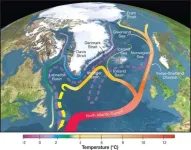(Press-News.org) The Arctic is warming at three to four times the global average. However, new research suggests the slowing of a key ocean current could reduce projected Arctic warming by up to 2 degrees Celsius by the end of the century.
For years, scientists have warned that unchecked Arctic warming could lead to devastating consequences, threatening wildlife and ushering in an era of more frequent and extreme weather events. Amid concerns for these types of outcomes, a study led by UC Riverside offers some limited relief.
The study, published in the Proceedings of the National Academy of Sciences, examined the effects that the slowing of the Atlantic Meridional Overturning Circulation, or AMOC, may have on the climate in the Arctic. The AMOC is the current that transports heat from the tropics to higher latitudes.
Though temperatures in the Arctic are projected to rise by 10 degrees Celsius by the end of the century, the study shows that when the slowing AMOC current is factored in, Arctic temperatures will only rise by 8 degrees Celsius.
“The AMOC is a critical component of our climate system because it moves heat around the globe,” said Yu-Chi Lee, UCR graduate student in Earth and Planetary Sciences and first author of the study. “We found that its weakening reduces the amount of heat reaching the Arctic, which slows down the rate of warming.”
Despite this potential benefit, the study highlights ongoing concerns for Arctic ecosystems. As sea ice melts, polar bears face habitat loss, which could make it more difficult for them to hunt and survive. Moreover, as the ice disappears, darker open water is exposed, which absorbs more sunlight and further accelerates warming through a process called the albedo effect.
While the slowdown may slightly reduce Arctic warming, the researchers caution that it may cause other climate disruptions. One of the most concerning is a potential shift in the Intertropical Convergence Zone, a tropical rain belt. If this rain belt moves southward, regions that depend on its rainfall could experience more frequent droughts, affecting agriculture and water supplies.
There are also misconceptions about the connection between sea ice and rising sea levels. Melting sea ice doesn’t directly cause sea levels to rise because the ice is already in the water, much like how melting ice cubes in a glass won’t cause it to overflow. However, land ice, such as glaciers, and the expansion of water as it heats up, do contribute to rising sea levels. The AMOC slowdown isn't a major factor in sea level rise, but it brings other significant changes to the climate system.
Wei Liu, UC Riverside associate professor of climate change and co-author of the paper, emphasized the complexity of the AMOC’s role in the global climate. “The AMOC slowdown may offer some temporary relief in the Arctic, but this is not a simple good-news story,” Liu said. “The overall impact on ecosystems and weather patterns, both in the Arctic and globally, could still be severe.”
The research team used a coupled climate model, which integrates interactions between the ocean, atmosphere, land, and sea ice. The researchers isolated the effect of the AMOC by running two simulations: one that allowed the AMOC to slow under the influence of rising greenhouse gases, and another that artificially maintained its strength by removing fresh water from the North Atlantic to increase salinity.
“Our simulations allowed us to clearly see how much of the future Arctic warming is tied to the AMOC slowdown,” Lee said. “Even though the slowdown reduces warming by a couple of degrees, the overall effects on Arctic ecosystems and the global climate system remain severe.”
Lee also emphasized that the slowdown began relatively recently, and there’s still debate among scientists about how long it has been happening and whether it will continue.
“Direct, in-situ observations of AMOC strength began around 2004, so it’s a relatively short timeframe from which to draw long-term conclusions,” she said. “But there are studies suggesting it could collapse by the end of this century, which would have huge implications.”
Looking ahead, Lee remains focused on the bigger picture. “While the AMOC slowdown might provide some short-term benefits, its broader impacts show us that even small shifts in ocean circulation can cause ripple effects across the planet. Climate change is far from a one-region issue,” she said. “The future of the Arctic—and the world—depends on how we respond today.”
END
Slowing ocean current could ease Arctic warming -- a little
Weaker AMOC could transport less heat to higher latitudes
2024-10-25
ELSE PRESS RELEASES FROM THIS DATE:
Global, national, and regional trends in the burden of chronic kidney disease among women
2024-10-25
San Diego, CA (October 25, 2024) — A recent analysis reveals that the number of chronic kidney disease (CKD) cases in women around the globe nearly tripled in the past three decades. Also, type 2 diabetes and hypertension were the leading causes of CKD-related deaths in women. The research will be presented at ASN Kidney Week 2024 October 23– 27.
The analysis drew from the Global Burden of Disease study 2021, a comprehensive effort to quantify health loss across the world over time. The study includes information from 204 countries and territories.
From 1990 to 2021, the average annual percentage ...
Scientific discovery scratching beneath the surface of itchiness
2024-10-25
Ever had an itchy nose or, worse, an unreachable spot on your back that drives you mad? Now imagine an itch that refuses to go away, no matter how hard or long you scratch. That persistent itch, or pruritus, may actually be one of the skin’s first lines of defense against harmful invaders, according to neuroimmunologist Juan Inclan-Rico of the University of Pennsylvania.
“It’s inconvenient, it’s annoying, but sensations like pain and itch are crucial. They’re ever-present, especially when it comes to skin infections,” says Inclan-Rico, a postdoctoral researcher in the Herbert Lab at ...
SFSU psychologists develop tool to assess narcissism in job candidates
2024-10-25
It feels like narcissism is everywhere these days: politics, movies and TV, sports, social media. You might even see signs of it at work, where it can be particularly detrimental. Is it possible to keep a workplace free of destructive, manipulative egotists?
More and more organizations have come to San Francisco State University’s experts in organizational psychology asking for help doing just that. In response, University researchers developed a tool for job interviews to assess narcissistic grandiosity among potential job candidates. San Francisco State Psychology Professors Kevin Eschleman and Chris ...
Invisible anatomy in the fruit fly uterus
2024-10-25
You have likely not spent much time thinking about the uterus of the fruit fly, Drosophila melanogaster. But then, neither have most scientists, even though Drosophila is one of the most thoroughly studied lab animals. Now a team of biologists at the University of California, Davis, has taken the first deep look at the Drosophila uterus and found some surprises, which could have implications not just for understanding insect reproduction and potentially, pest control, but also for understanding fertility in humans.
The work is published Oct. 25 in Proceedings of the National Academy of Sciences.
Drosophila have been a favorite subject for ...
Skeletal muscle health amid growing use of weight loss medications
2024-10-25
A recent commentary published in The Lancet journal highlights the critical importance of skeletal muscle mass in the context of medically induced weight loss, particularly with the widespread use of GLP-1 receptor agonists. These medications, celebrated for their effectiveness in treating obesity, have raised concerns regarding the potential for substantial muscle loss as part of the weight loss process.
Dr. Steven Heymsfield, professor of metabolism and body composition, and Dr. M. Cristina Gonzalez, adjunct and visiting professor in metabolism-body composition, both of Pennington Biomedical Research Center, joined colleagues Dr. Carla Prado of the University ...
The Urban Future Prize Competition awards top prizes to Faura and Helix Earth Technologies and highlights climate adaptation solutions with the inaugural Future Resilience Prize
2024-10-25
NYU Tandon School of Engineering's Urban Future Lab named the winners of its 2024 Future Resilience and Future Solutions prizes, at its 8th annual Urban Future Summit on October 24, 2024 at the Brooklyn Navy Yard in New York City. Through the generous support of The New York Community Trust, MUFG Bank, Mitsubishi Corporation (Americas), the Urban Future Lab continues to catalyze groundbreaking solutions for the climate crisis and this year, they’ve expanded their focus to include adaptation as a critical piece of the puzzle.
After an afternoon of pitches, the jury, comprised of industry experts and ...
Wayne State researcher secures two grants from the National Institute on Aging to address Alzheimer’s disease
2024-10-25
DETROIT – A Wayne State University School of Medicine faculty member has been awarded a total of $2.3 million by the National Institute on Aging of the National institutes of Health for two new, concurrent projects that both address questions related to Alzheimer’s disease, a progressive, age-related degenerative brain disease characterized by memory problems, impaired judgment, cognitive issues and changes in personality.
Joongkyu Park, Ph.D., assistant professor of pharmacology and of neurology, is the principal investigator on “Local protein synthesis ...
NFL’s Bears add lifesavers to the chain of survival in Chicago
2024-10-25
CHICAGO, October 22, 2024— The American Heart Association and the Chicago Bears brought cardiopulmonary resuscitation (CPR) and automated external defibrillator (AED) training to the Illinois High School Association (IHSA) Girls Flag Football State Finals on Saturday, Oct. 19. More than 150 youth athletes, coaches and league administrators learned lifesaving skills building their confidence and capabilities to respond in the event of a cardiac emergency. According to American Heart Association data, 9 out of every 10 people who experience cardiac arrest outside of a hospital die, in part ...
High-impact clinical trials generate promising results for improving kidney health: Part 1
2024-10-25
The results of numerous high-impact phase 3 clinical trials that could affect kidney-related medical care will be presented in-person at ASN Kidney Week 2024 October 23–27.
Finerenone—a selective non-steroidal mineralocorticoid receptor antagonist—has been shown to have kidney protective effects in individuals with chronic kidney disease (CKD) with type 2 diabetes, but its effects on kidney outcomes in patients with heart failure with and without diabetes and/or CKD are not known. To investigate, researchers analyzed data from 6,001 participants enrolled in the FINEARTS-HF trial, a global, randomized ...
Early, individualized recommendations for hospitalized patients with acute kidney injury
2024-10-25
About The Study: Among patients hospitalized with acute kidney injury, recommendations from a kidney action team did not significantly reduce the composite outcome of worsening acute kidney injury stage, dialysis, or mortality, despite a higher rate of recommendation implementation in the intervention group than in the usual care group.
Corresponding Author: To contact the corresponding author, F. Perry Wilson, MD, email francis.p.wilson@yale.edu.
To access the embargoed study: Visit our For The Media website at this link https://media.jamanetwork.com/
(doi:10.1001/jama.2024.22718)
Editor’s Note: Please see the article ...
LAST 30 PRESS RELEASES:
Hunter-gatherers northwestern Europe adopted farming from migrant women, study reveals
Light-based sensor detects early molecular signs of cancer in the blood
3D MIR technique guides precision treatment of kids’ heart conditions
Which childhood abuse survivors are at elevated risk of depression? New study provides important clues
Plants retain a ‘genetic memory’ of past population crashes, study shows
CPR skills prepare communities to save lives when seconds matter
FAU study finds teen ‘sexting’ surge, warns of sextortion and privacy risks
Chinese Guidelines for Clinical Diagnosis, Treatment, and Management of Cirrhosis (2025)
Insilico Medicine featured in Harvard Business School case on Rentosertib
Towards unlocking the full potential of sodium- and potassium-ion batteries
UC Irvine-led team creates first cell type-specific gene regulatory maps for Alzheimer’s disease
Unraveling the mystery of why some cancer treatments stop working
From polls to public policy: how artificial intelligence is distorting online research
Climate policy must consider cross-border pollution “exchanges” to address inequality and achieve health benefits, research finds
What drives a mysterious sodium pump?
Study reveals new cellular mechanisms that allow the most common chronic cardiac arrhythmia to persist in the heart
Scientists discover new gatekeeper cell in the brain
High blood pressure: trained laypeople improve healthcare in rural Africa
Pitt research reveals protective key that may curb insulin-resistance and prevent diabetes
Queen Mary research results in changes to NHS guidelines
Sleep‑aligned fasting improves key heart and blood‑sugar markers
Releasing pollack at depth could benefit their long-term survival, study suggests
Addictive digital habits in early adolescence linked to mental health struggles, study finds
As tropical fish move north, UT San Antonio researcher tracks climate threats to Texas waterways
Rich medieval Danes bought graves ‘closer to God’ despite leprosy stigma, archaeologists find
Brexpiprazole as an adjunct therapy for cognitive dysfunction in schizophrenia
Applications of endovascular brain–computer interface in patients with Alzheimer's disease
Path Planning Transformers supervised by IRRT*-RRMS for multi-mobile robots
Nurses can deliver hospital care just as well as doctors
From surface to depth: 3D imaging traces vascular amyloid spread in the human brain
[Press-News.org] Slowing ocean current could ease Arctic warming -- a littleWeaker AMOC could transport less heat to higher latitudes




